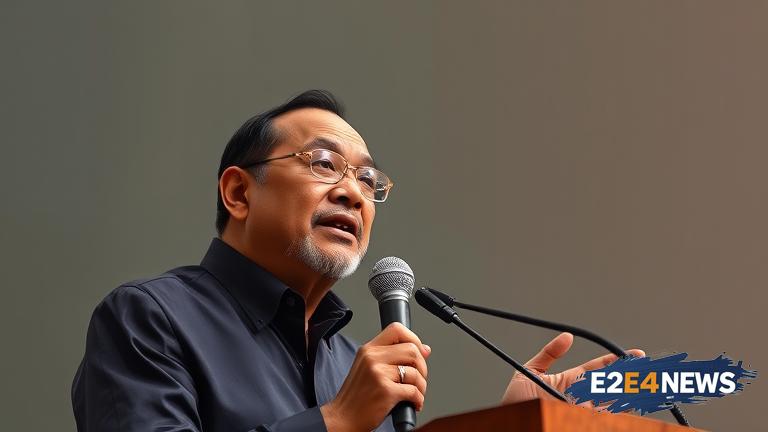In a recent statement, Malaysian Prime Minister Anwar Ibrahim highlighted the crucial role of discourse in fueling the country’s progress. According to Anwar, discourse is essential for fostering a culture of critical thinking, creativity, and innovation, which are vital for Malaysia’s growth and development. He emphasized that discourse allows for the exchange of ideas, opinions, and perspectives, enabling the country to tap into the collective wisdom of its citizens. Anwar also noted that discourse helps to promote understanding, tolerance, and empathy, which are essential for building a harmonious and inclusive society. Furthermore, he stressed that discourse is critical for addressing the country’s challenges and finding solutions to its problems. Anwar’s statement comes at a time when Malaysia is facing numerous challenges, including economic uncertainty, social inequality, and environmental degradation. The Prime Minister’s emphasis on discourse is seen as a call to action for Malaysians to engage in constructive dialogue and debate, with the aim of finding solutions to these challenges. Anwar’s administration has been working to promote discourse and dialogue, through various initiatives such as town hall meetings, public forums, and online engagement platforms. These efforts aim to create a culture of openness, transparency, and accountability, where citizens can freely express their opinions and participate in the decision-making process. The importance of discourse in Malaysia’s progress is also reflected in the country’s history, where public debates and discussions have played a significant role in shaping the nation’s development. For instance, the Malaysian Constitution, which was drafted through a process of public consultation and discourse, has been instrumental in promoting democracy, human rights, and the rule of law. Moreover, the country’s economic transformation, from an agrarian economy to a modern industrialized nation, was facilitated by discourse and debate among policymakers, business leaders, and civil society. Today, Malaysia continues to face new challenges, such as the impact of globalization, climate change, and technological disruption, which require a collective and informed response. In this context, Anwar’s emphasis on discourse is seen as a timely reminder of the need for Malaysians to come together, share their ideas and perspectives, and work towards a common goal of building a better future for all. The Prime Minister’s statement has been welcomed by civil society groups, who see it as an opportunity to promote greater public engagement and participation in the country’s development. However, some critics have argued that the government needs to do more to create an enabling environment for discourse, including protecting freedom of speech and assembly, and promoting media freedom. Despite these challenges, Anwar’s administration remains committed to promoting discourse and dialogue, recognizing that it is essential for building a more inclusive, equitable, and prosperous society. In conclusion, the importance of discourse in Malaysia’s progress cannot be overstated, and Anwar’s statement serves as a reminder of the need for ongoing dialogue and debate in shaping the country’s future. As Malaysia continues to navigate the complexities of the 21st century, it is clear that discourse will play a vital role in driving the country’s growth, development, and progress. With its rich cultural heritage, diverse population, and strategic location, Malaysia is well-positioned to become a hub for discourse and dialogue, not just in the region, but globally. The country’s experience in promoting discourse and dialogue can serve as a model for other nations, demonstrating the power of collective engagement and participation in driving progress and development. Ultimately, the future of Malaysia will depend on its ability to foster a culture of discourse, where citizens can freely express their opinions, engage in constructive debate, and work together towards a common goal of building a better future for all.
